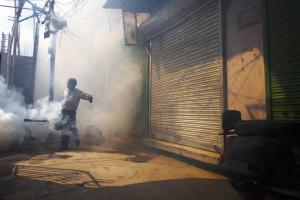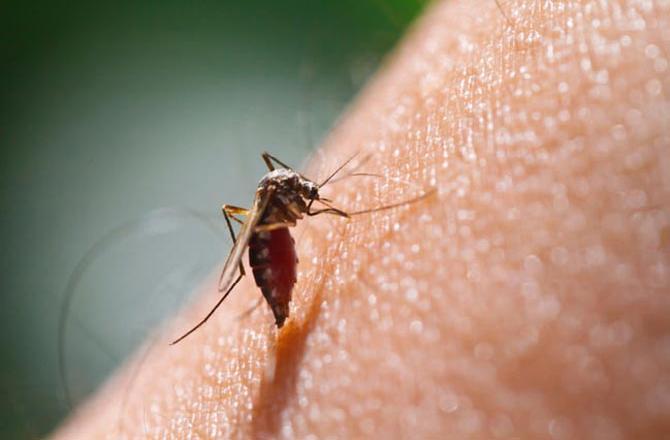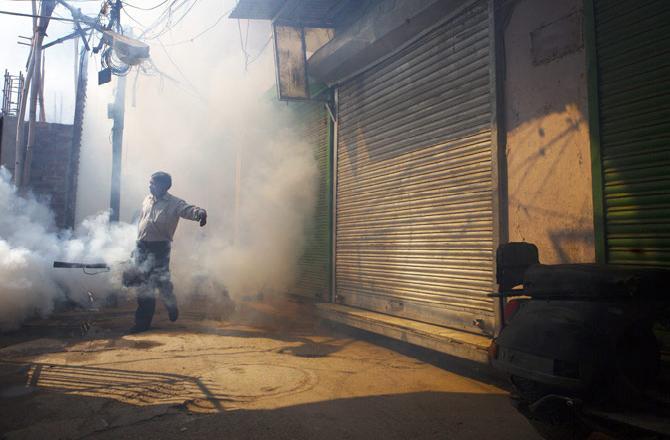While most of these diseases can be prevented and cured by following a set of safe practices, a number of them require proper medical attention, or they can turn fatal.

Representational Pic
Monsoons in India bring with them a certain kind of excitement and novelty – the fresh scent of the earth, childhood memories of splashing in puddles, vibrant greenery everywhere, and the tantalising taste of pakodas, fresh out of the pan. However, these joys are often interrupted by many germs and viruses which accompany the season, which in turn, can lead to a host of deadly diseases or infections.
While most of these diseases can be prevented and cured by following a set of safe practices, a number of them require proper medical attention, or they can turn fatal.
Malaria
The most frequent disease of the season, malaria is caused by a bite from the female Anopheles mosquito that breeds in small pools of stagnant water.

Symptoms:
- High fever
- Body ache
- Body Chills
- Sweating
- Severe anaemia
Prevention:
Malaria can be prevented by using mosquito repellents. As these insects breed in stagnant water, it is also advisable to maintain a hygienic environment, free from swampy conditions.
Dengue
Dengue is a viral infection spread by the bite of a female AedesAegypti mosquito, which is responsible for spreading Zika, yellow fever, and Chikungunya. This disease generally manifests as simple flu, but if left untreated, can turn fatal. Serious cases of dengue can turn into dengue hemorrhagic fever or DHF.

Symptoms:
- Headache
- Eye pain (typically behind the eyes)
- Muscle, joint, or bone pain
- Rashes
- Nausea and vomiting
- Unusual bleeding (nose or gum bleed, small red spots under the skin, or unusual bruising)
Prevention:
The best ways to prevent dengue are by using mosquito repellents, preferably EPA-registered ones. Sleeping in air-conditioned rooms also help as mosquitoes cannot survive in a cold environment.
Chikungunya:
Chikungunya is caused by the bite of an Aedes Aegypti mosquito but is rarely fatal. It shares a number of clinical symptoms with dengue, and as a result, has been known to be misdiagnosed in areas where dengue is common.
Symptoms:
- High fever (40°C/ 104°F)
- Joint pain (lower back, ankle, knees, wrists, or phalanges)
- Joint swelling
- Rashes
- Headaches
- Muscle pain
- Nausea
- Fatigue
Prevention:
As this disease is caused by the same species of mosquito that spreads dengue, the prevention for chikungunya is the same as for dengue–using mosquito repellents and nets, or sleeping in an air-conditioned room.
Typhoid
Caused by the S. Typhi bacteria, this is a waterborne disease and can be contracted by the consumption of contaminated water or food.
Symptoms:
- Prolonged high fever
- Weakness
- Abdominal Pain
- Constipation
- Headaches
- Vomiting
Prevention:
Typhoid is a contagious disease, and thus, in order to prevent it, one should keep their hands clean and maintain a clean hygienic environment. Other ways to avoid getting infected include refraining from consuming street food, and by frequently drinking water and fresh healthy fluids.
Stomach Infection
Stomach infections are caused by the consumption of unhygienic food or fluids. Gastroenteritis is a prevalent stomach infection that occurs during this season.
Symptoms:
- Low-grade fever
- Nausea, vomiting, or both
- Abdominal cramps and pain
- Diarrhoea
Prevention:
Stomach infections can be avoided by drinking boiled water and refraining from eating stale food or eatables left out in the open for a long time.
Cholera
Cholera is a common bacterial disease during the monsoons and is caused due to the consumption of contaminated water or food prepared with such water. This contamination is caused because of a bacteria known as Vibrio Cholerae. It can also be caused by poor hygiene and sanitation. It is important to identify the disease as soon as possible and begin treatment, as cholera can turn fatal within hours.
Symptoms:
- Diarrhoea
- Low blood pressure
- Thirst
- Muscle cramps
- Rapid heart rate
- Dry mucous membrane
- Loss of skin elasticity
Prevention:
The best way to prevent cholera is by eating home-cooked food. Raw fish, salads, and uncooked vegetables should be avoided.,. Since it is a water-borne disease keep in mind to consume only bottled or boiled water.
Certain weather conditions, such as a sudden drop in temperature and humidity may affect the immune, making the body susceptible to diseases. It is imperative that we take appropriate preventive measures to avoid falling prey to these ailments, especially during monsoons.
By -
Dr. Hakimuddin Pardawala – Physician, Saifee Hospital
Catch up on all the latest Crime, National, International and Hatke news here. Also download the new mid-day Android and iOS apps to get latest updates
 Subscribe today by clicking the link and stay updated with the latest news!" Click here!
Subscribe today by clicking the link and stay updated with the latest news!" Click here!







